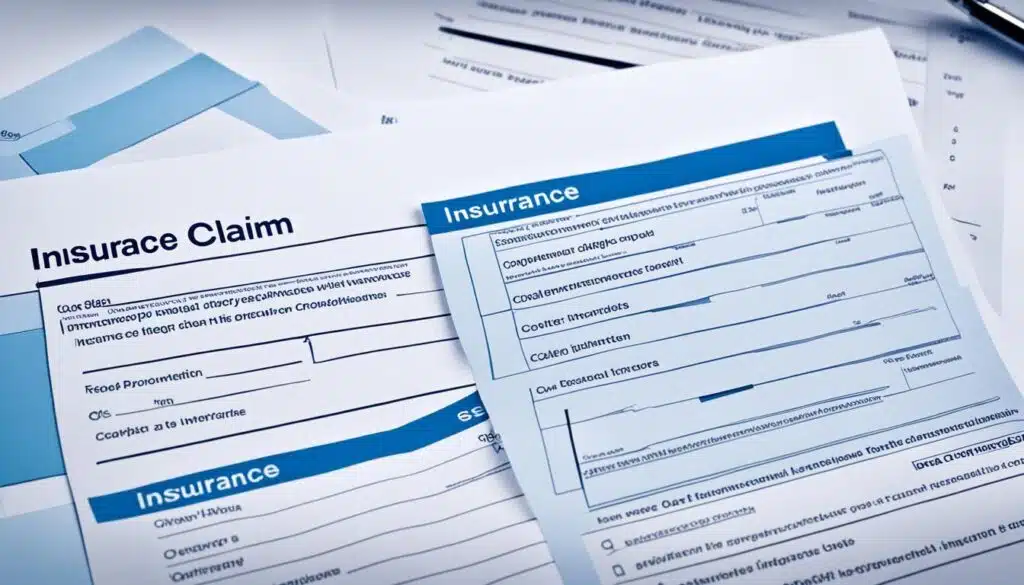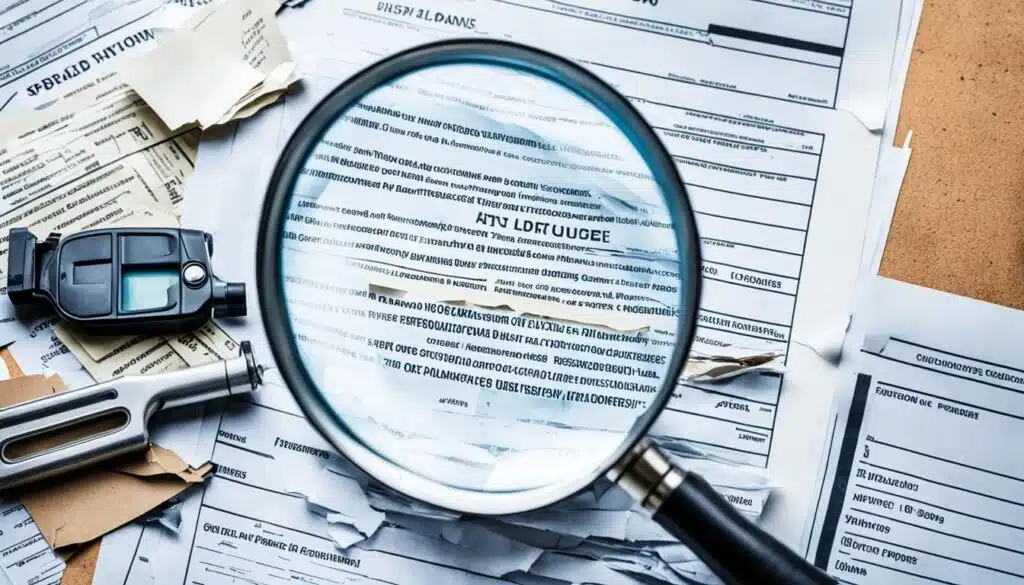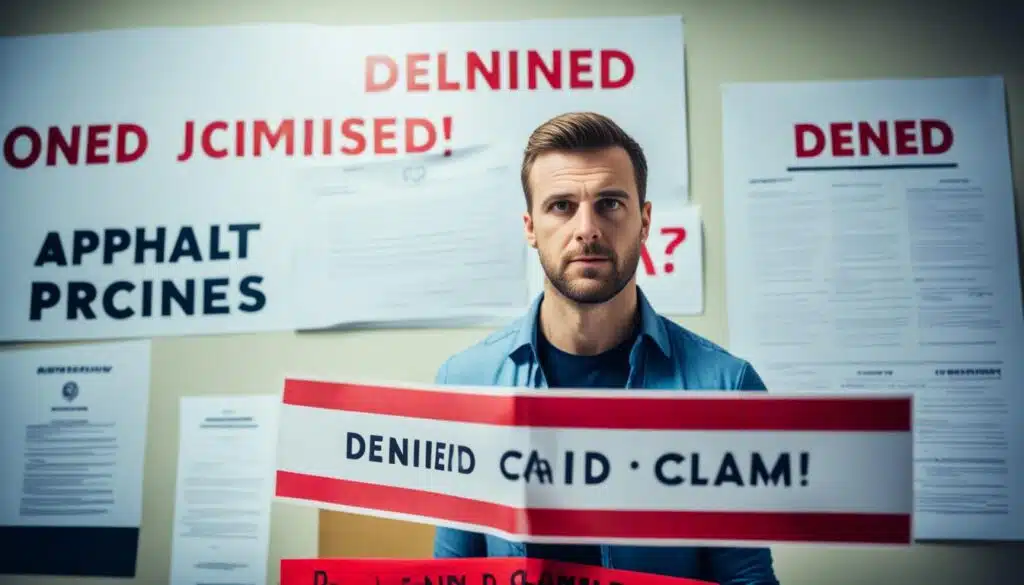It’s a tough moment when things go wrong. You find yourself needing to make an initial claim. So, who do you call first? What do you need to do? Dealing with losses can be hard, but it doesn’t have to be confusing. You’ve got a claims adjuster expert to help you through. They’re there to guide you as you get things back on track.
The insurance claim process claim has about five main steps. It starts from when you first report the loss. Then, it goes on until the claim is fully settled. To get ready, make sure you have all the needed papers. This includes receipts, invoices, and ownership proofs. Also, pictures and details about the incident or damage are key. And, it’s good to know what the steps ahead are.
Key Takeaways
- The insurance claim process typically involves five main stages, from reporting the loss to resolving the claim.
- Gather relevant documents, photos, and accounts of the incident to prepare for the claims process.
- Contact your insurance broker or agent as the first step in reporting your loss or incident.
- Give as much info and proof as you can to support your claim.
- Knowing your policy’s coverage, deductibles, and limits helps you smoothly handle the claims process.
Understanding the Insurance Claim Process
An insurance claim is a formal request sent to an insurance company. You ask for payment because of a covered loss or event. The process has many steps, from reporting the loss to getting the payment. Knowing these steps can make things easier for you.
What is an Insurance Claim?
An insurance claim asks the company to cover your loss. It can be for car, home, or personal belongings damage. Or for medical bills from an accident or sickness. The insurance company then looks into your claim to decide how much they’ll pay.
When to File an Insurance Claim
File a claim when there’s a loss your policy covers. This includes damage to your car or home, or if you’ve been in a car accident. It’s a way to ask your insurance company to help with the costs.
| Type of Claim | When to File | Information Needed |
|---|---|---|
| Auto Insurance Claim | After a car accident or theft of your vehicle | Police report, photos of damage, repair estimates |
| Homeowners Insurance Claim | When your home or belongings are damaged by a covered event | Photos of damage, receipts for repairs or replacement items |
| Life Insurance Claim | After the policyholder’s death | Death certificate, policy information |
| Health Insurance Claim | When you receive medical care or need to fill a prescription | Medical bills, explanation of benefits from your insurer |
Knowing about insurance company may claims and when to file is important. It ensures you get the right payment from your company for your losses.
Report Your Loss or Incident

The first thing to do when claiming insurance is telling your broker or agent what happened. They are your main go-to for anything about your policy. You should give them all the details about what got damaged or lost. Show them photos or videos too. This makes it easier for everyone to understand the situation.
Your broker or agent will then talk with the insurance agent. They will help move your claim along.
Contact Your Insurance Broker or Agent
Reaching out to your broker or agent is the first step to get your claim going. They will help you understand what your policy covers. They’ll also tell you what documents you need and explain the steps.
Be prepared to talk about the incident, like when and where it happened. Tell them everything you know about the damage or loss.
Provide Detailed Information and Documentation
It’s crucial to give your claim as much detail as you can. Give them receipts, invoices, and any proof you have to show what was lost or damaged. For home damage or injuries, they might ask for a police report. Having these documents ready makes things go smoother.
If your car needs fixing or you’ve had to spend money after an incident, provide every cost detail. Useful tips include detailed descriptions and receipts.
This helps your insurance company pay for what you need and makes the process quick.
Claim Investigation and Evaluation

They will check how much damage or loss occurred and what your policy covers. The adjuster will gather info, look at the damage, and decide.
Role of the Insurance Adjuster
The adjuster might visit the site, check documents, and talk to people who saw it. This is to get all the info they need to process your claim. Then, they will look at your policy to see what is covered and not. Their work is key in figuring out the final settlement for you.
Determining Liability and Coverage
By checking the scene of the accident and the copy of the police report, they can figure out who’s at fault. Next, they see if your policy covers the damages. This claim adjudication process is important. It ensures you get the correct claim settlement for your losses.
| Key Process | Description |
|---|---|
| Claim Investigation | The insurance adjuster gathers information, assesses the damage, and determines liability. |
| Claim Documentation | The adjuster reviews the policy, claim documentation, and any supporting evidence to verify the claim. |
| Claim Verification | The adjuster ensures the claim is covered by the policy and the settlement amount is accurate. |
| Claim Adjudication | The adjuster determines the appropriate claim settlement based on the investigation and policy coverage. |
| Claim Denial | If the claim is not covered, the adjuster will provide a written explanation for the claim denial. |
| Claim Appeals | The policyholder can appeal the claim denial by providing additional claim documentation and evidence. |
| Claim Reimbursement | Once the claim is approved, the insurance company will issue the claim settlement payment. |
Review of Your Insurance Policy

After checking the claim with your insurance company, the insurance adjuster will look over your policy. They will see what is and isn’t covered by your insurance policy. They figure out the covered losses and any exceptions or limits. The adjuster also tells you about any deductibles. These are what you must pay first before your insurance starts helping.
Covered Losses and Exclusions
Your policy clearly states what it covers. This can be damage from an accident, theft, natural disasters, and more. But remember, your policy might not cover everything. There could be exceptions, which you need to know. Understanding your coverage is key to knowing what you can get compensation for.
Deductibles and Limits
Besides knowing what your policy covers, be ready for any deductibles or limits. A deductible is what you pay first. Then your insurer helps. Coverage limits show the most they will pay. This info helps you know what costs you might have to cover yourself.
Damage Assessment and Appraisal

Your insurance adjuster might get help from appraisers, engineers, or contractors to look at the damage. They give expert opinions and check closely.
These professionals will inspect the damage. Then, they write a detailed list of what needs fixing and the costs involved.
Preferred Repair Vendors
The adjuster could give you a list of preferred repair vendors. They have been pre-approved. Using them is not required, but it can be beneficial.
Choosing from these vendors might save you time and make sure the repairs are top-notch. This damage assessment and appraisal is key for settling how much you’ll get from the claim.
Insurance Claim

After checking the damage and figuring out the cost, the repair and replacement start. This involves fixing or getting new stuff like your car or house. Your insurance worker helps make sure things go right. They work with your chosen place to fix or with places the insurance recommends.
When replacing or fixing things, it’s key to record everything. Keep all the papers, like bills and photos, as you sort things out. Having these records means you’re likely to get all the money you should from your insurance.
| Repair and Replacement | Documentation and Receipts |
|---|---|
| Coordinate with insurance adjuster on repairs or replacements | Maintain detailed records of all expenses |
| Use preferred vendors or your own choice | Collect invoices, receipts, and photographs as proof |
| Ensure work is done properly to restore your property | Provide comprehensive claim documentation to insurance company |
Good record-keeping helps your claim with insurance go smoothly. Keep track of all papers and receipts during the process.
Claim Settlement and Payment
After repairs and replacing lost items, the insurance adjuster will get back to you. They will talk about the claim settlement and the final payment. This step might involve some negotiating settlements. You and the insurance company could see differently on the fair payment amount.
Your adjuster is there to help. They want to make sure the settlement is just right. It should cover your losses as needed.
Negotiating Settlements
Settling the claim might need some talking back and forth. You and the insurance may not agree on the money you should get. Your adjuster steps in to help. They aim to find a figure that is fair to all. This figure should cover what’s lost under your policy.
Payment Options and Timelines
How soon you get your settlement money can vary. It depends on how complex or big your case is. But, the insurance company has to pay within a set time after approving your claim.
Your adjuster will also talk about ways to get your money. They make sure you know when to expect your settlement. They offer options so you can find the best way to get paid.
Tips for Navigating the Claims Process

Dealing with insurance claims may doesn’t have to be hard. There are steps you can take to make things easier. It all starts with being organized and ready for every step.
Be Proactive and Organized
First, gather all your important papers like receipts and photos. Keep notes of every talk with your insurance company. This will keep you on track and back up your case. Know exactly what your insurance needs from you, and follow their rules closely.
Communicate with Your Insurer
Talking often with your insurance person is key. Answer their questions fast and let them know if things change. Being clear and active speeds things up and makes sure you’re treated fairly. Don’t forget, your insurer is here to help, so ask anytime you need advice or support.
Appealing a Denied or Underpaid Claim

If your insurance claim is denied or you think you didn’t get enough, you can make an appeal. First, get the reasons for the denial from the insurance company. These reasons must be given to you in writing. Then, go through your policy and your submitted info. Look for any differences or missing parts.
Understanding Denial Reasons
Knowing why your claim with the insurance was denied is your starting point. Use this info to build a stronger case. You might need photos, receipts, or expert opinions. Showing clearly what you lost or the damage is key. This builds a solid argument, making your appeal more likely to succeed.
Gathering Additional Evidence
Stay determined and make a strong case for your claim. The appeal process can be slow. But, if you’re clear and have good evidence, you stand a better chance. You can turn around a denied or underpaid claim this way.
Importance of Timely Filing
It’s essential to file your insurance claim quickly. Most insurance policies set a deadline for reporting losses. Missing this deadline might mean you won’t get the coverage you need. Try to file a claim right after the event and give your insurance all required details. This way, you make sure your claim is handled quickly. And that you get paid as your policy promises.
Working with Other Insurance Companies

If your insurance claim involves a third-party, like another driver or property owner, you’ll work with their insurance company, too. The process might be different from what your own insurer follows. Your insurance might also do subrogation. This is when they try to get back the money they spent from the other party’s insurer.
Third-Party Insurance Claims
Handling a third-party insurance claim is unique. You must deal with your insurer and the other party’s insurer. This can make the process more complex. It’s key to keep things organized and communicate well with everyone involved. This ensures a smooth and fair outcome.
Subrogation and Reimbursement
Your insurer might opt for subrogation. This lets them seek payment from the at-fault party’s insurer. You should understand how this works. It helps you steer through your claim with more awareness and protection.
Working well with other insurers and grasping third-party insurance claims and subrogation makes a claim end productively. You can contribute to a simpler resolution this way.
Also Read : Clearcover Insurance Affordable Car Coverage
FAQs
Q: What are the different types of insurance claims?
A: Insurance claims can vary based on the type of incident, but common types include auto insurance claims, property damage claims, health insurance claims, and liability claims.
Q: How Does the Insurance Claims Process Work When Someone Makes a Claim?
A: When you need to file a claim, you typically contact your insurance company to report the incident, fill out a claim form, provide any necessary documentation, such as police reports or estimates, and the insurance company will assess the claim and provide a resolution.
Q: How do I file a claim with my car insurance?
A: To file a car insurance claim, you need to contact your insurance company as soon as possible after the incident, provide details of the accident, document any damages, and follow their instructions for submitting a claim.
Q: Will filing an insurance claim work affect my insurance premiums?
A: Depending on the type of claim and your insurance company’s policies, filing a claim could result in higher insurance premiums. It’s best to check with your insurer to understand how filing a claim could impact your rates.
Q: How long does it take to get an insurance claim paid?
A: The time it takes for an insurance claim to be processed and paid can vary depending on the complexity of the claim and the insurance company’s procedures. It’s advisable to follow up with your insurer to track the progress of your claim.
Q: What should I do if my insurance claim is denied?
A: If your insurance claim is denied, you can appeal the decision with your insurance company, seek legal advice to understand your options, or provide additional documentation to support your claim.
Q: How can I ensure a smooth insurance claims process?
A: To ensure a smooth insurance claims process, gather all necessary information, such as contact details for witnesses, get estimates for repairs, keep in touch with your insurance company, and follow their instructions closely throughout the claims process.
Source Links
- https://www.tdi.texas.gov/tips/getting-your-insurance-claim-paid.html
- https://www.northbridgeinsurance.ca/blog/5-steps-insurance-claims-process/
- https://empeek.com/insights/complete-guide-on-the-insurance-claims-process/
Conclusion
The insurance claim process can look hard, but with preparation and understanding, it gets easier. First, report the loss fast. Then, create detailed documents. Work with the insurance adjuster closely. Know your policy inside and out. Stay in touch with your insurer regularly. Doing these steps right helps get your claim settled fairly and quickly.
Your insurance company wants to help you recover. Feel free to ask for help and advice. With the right moves, you can lower the stress. This way, your claim will go smoothly and be resolved effectively.
In short, the conclusion highlights how important it is to be ready, organized, and not give up. Understanding the process and using the help available makes you more confident. You can make sure you get what you should from your policy. The summary of key points shows what really matters in making an insurance claim work out well.





